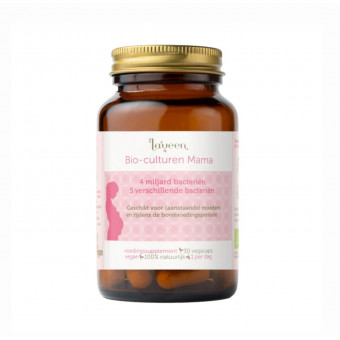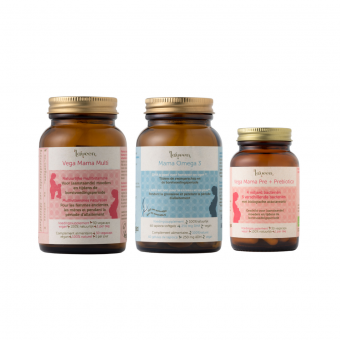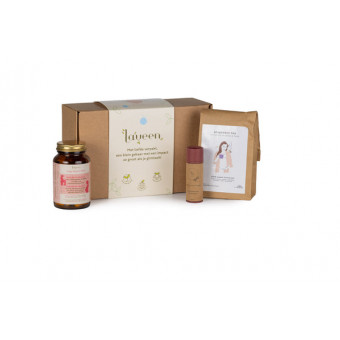Ako úspešne otehotnieť - kľúčové vitamíny a živiny
16.11.24

Plodnosť a výživa: Sprievodca diétou pred tehotenstvom
Predtým, ako farmár zaseje semienko, pripraví pôdu tak, aby mala dostatok a prísun všetkého, čo semienko potrebuje pre svoje vyklíčenie a rast. Vaše telo je výživnou pôdou pre zrod nového života. Ako farmár pôdu čistí, kyprí, hnojí a zalieva, aj vy by ste sa mali postarať o svoje telo, aby bolo pripravené na zrod nového človiečika.
Ste to, čo jete. Správna výživa zvyšuje šance na počatie a zdravé tehotenstvo a tiež znižuje riziko vrodených chýb dieťatka, ako je napríklad spina bifida (rázštep chrbtice). Ide o stav, ktorý sa vyznačuje neúplným uzavretím určitých stavcov a obnaženiu miechy.
Ženské vajíčka majú 120-dňový životný cyklus, takže je dôležité zabezpečiť, aby ste sa dobre stravovali a optimalizovali príjem svojich živín 4 mesiace PRED tým, ako chcete otehotnieť. U mužov majú spermie 90-dňový životný cyklus, takže potrebujeme, aby sa 3 mesiace pred počatím začali zdravo stravovať. Pamätajte, že kyselina listová je kľúčom k plodnosti, takže nielen že musíte jesť veľa listovej zeleniny, ale s najväčšou pravdepodobnosťou ju budete musieť aj dopĺňať.
Konzumácia nasledovných vitamínov a živín je spojená so zvýšenou plodnosťou. Aby ste dosiahli čo najlepšie výsledky, zaraďte ich ihneď do svojho jedálnička.
Folát = kyselina listová
Folát, alebo kyselina listová, je vitamín skupiny B s číslom 9, ktorý pomáha vytvárať červené krvinky počas tehotenstva, čo poskytuje embryu tie najlepšie podmienky na uchytenie. Je dôležité predchádzať defektom neurálnej trubice, anatomickým defektom mozgu a diagnózam ako napríklad spina bifida. Hladiny kyseliny listovej je nevyhnutné optimalizovať už v štádiu pred počatím. Dôvod, prečo pre prípravu potrebujeme až 4-mesačné obdobie pred otehotnením je ten, že nervová trubica dieťatka sa uzavrie už okolo 21. dňa života plodu a to je čas, keď väčšina žien ešte ani nevie, že sú tehotné.
Problémom, ktorý môže vzniknúť aj pri dostatočnom prísune kyseliny listovej je, že telo nedokáže premeniť tento dôležitý vitamín na jeho aktívnu formu. Príčinou môže byť unavená a spomalená pečeň, ktorá je spoluzodpovedná za dôležitý zložitý chemický proces v tele nazývaný metylácia. Pri problémoch s otehotnením je preto dobré zvážiť detoxikáciu organizmu. Výborným detoxom zameraným na pečeň je 3-6-9 očista z knihy Záchrana pečene.
Ďalšou príčinou nedostatku kyseliny listovej v organizme môže byť zvýšená konzumácia alkoholu, antikoncepčné tabletky, vysoké dávky vitamínu C, niektoré lieky na liečbu epilepsie a sulfonamidy.
Rastlinné zdroje kyseliny listovej: listová zelenina, citrusové plody, brokolica, papája, banány, avokádo.
Vyskúšajte prírodné Laveen Vega Mama Multi tehotenské vitamíny, ktoré obsahujú aktívnu formu kyseliny listovej - folát. Táto forma kyseliny listovej nevyžaduje enzymatickú konverziu, vďaka čomu ho telo dokáže lepšie využiť.
Vápnik
99 % vápnika, ktorý skonzumujete, ide do vašich zubov a kostí, ale je dôležité vytvárať zásoby vápnika aj pre kosti a zuby dieťaťa. Pri nedostatku môže plod čerpať vápnik z kostí matky, čo vedie k vyššiemu riziku osteoporózy - stavu, pri ktorom kosti slabnú a lámu sa. Príjem 1 000 miligramov vápnika denne je dôležitý pred, ale i počas tehotenstva. Pri vstrebávaní vápnika do krvi výrazne pomáha vitamín D3. Deje sa to v tenkom čreve.
Rastlinné zdroje vápnika:
| Potravina 100 g | Vápnik (mg) | Potravina 100 g | Vápnik (mg) |
| Mak | 1400 | Fenykel | 109 |
| Sezamové semienka | 670 | Brokolica | 105 |
| Mandle - jadrá | 240 | Orechy vlašské - jadrá | 94 |
| Karfiol | 205 | Petržlen | 89 |
| Figy sušené | 193 | Marhule sušené | 82 |
| Orechy para - jadrá | 170 | Špenát | 81 |
| Orechy lieskové - jadrá | 140 | Pór | 80 |
| Kel | 115 | Hrozienka | 80 |
| Semienka slnečnice | 110 | Orechy miešané - jadrá | 78 |
Ďalej sú to sušené slivky, sušené huby, zeler, kaleráb, ďatle, olivy, pekanové orechy, pistácie, arašidy, šošovica, zelená fazuľka, hrach, ovsené vločky, artičoky, orechy macadamia, gaštany, čierne ríbezle, biela kapusta, černice, pomaranče, čínska kapusta, maliny, mrkva, cesnak, kiwi, reďkovky, červená kapusta, kešu, sušený banán, cibuľa, cuketa, jablká, tmavá listová zelenina, a chia semienka.
Pozrite si Laveen Vega Mama Multi vitamíny pre tehotné, ktoré okrem ďalších vitamínov a minerálov obsahujú vitamín D3 z lišajníka. Eidon Iónový vápnik nájdete tu.
Omega-3 mastné kyseliny
Sú to kyselina eikosapentaenová (EPA) a kyselina dokosahexaenová (DHA). Omega-3 mastné kyseliny podporujú plodnosť u mužov aj žien. Zlepšujú morfológiu a pohyblivosť spermií u mužov. Dlhodobý príjem omega-3 u žien predĺžil ich reprodukčnú životnosť vajíčok a dokonca aj krátkodobý príjem mal význam pre zlepšenie ich kvality. Omega-3 tiež prispievajú k zdraviu embrya a pomáhajú udržiavať jeho zdravý vývoj po počatí. Sú dôležité pre vývoj mozgu plodu a neskorší vývoj zraku dieťatka.
Rastlinné zdroje omega-3 mastných kyselín: Vlašské orechy, chia semienka, ľanové semienka, morské riasy.
Kúpte si Laveen Mama Omega 3, ktoré obsahujú kvalitný zdroj DHA z rias, sú bez chémie, bez GMO, ťažkých kovov (ortute), dioxínov, PCB látok a bez rybacej chuti.
Vitamín B12
Nedostatok vitamínu B12 môže spôsobiť neplodnosť, u mužov môže viesť k zníženiu počtu spermií, poškodeniu DNA v spermiách a predčasnej ejakulácii. U žien nedotatok tohto vitamínu sťažuje otehotnenie, spôsobuje abnormálnu ovuláciu, prípadne narušený vývoj vajíčka.
Vitamín C
Tento vitamín pomáha pri vývoji placenty a vďaka nemu sa lepšie vstrebáva železo.
Jód
Tento stopový prvok pomáha pri správnom fungovaní štítnej žľazy počas tehotenstva.
Prečítajte si viac o Tekutom iónovom jóde od Eidon Ionic Minerals, ktorý obsahuje iba jód a deionizovanú vodu.
Nejde len o to, čo jete, ale aj o to, čo nejete. Ak chcete, aby vaše tehotenstvo bolo zdravé, musíte niektoré potraviny obmedziť alebo odstrániť zo svojho jedálnička.
Potraviny, ktorým sa treba vyhnúť: ryby s vysokým obsahom ortuti, sóda, hranolky, vyprážané jedlá, spracované potraviny, ryžové cestoviny, nízkotučné mliečne výrobky, surové živočíšne produkty, lahôdkové mäso, nadmerný kofeín, GMO kukurica, sója a pšenica.
Homocysteín a plodnosť
Aminokyselina zvaná homocysteín je ďalším faktorom, ktorý môže ovplyniť úspešnosť počatia. Ide o pomerne nový objav, pri ktorom sa zistilo, že vysoká hladina homocysteínu v krvi pravdepodobne zvyšuje 3-násobne riziko potratov a poškodzuje cievy, čím môže brániť v zahniezdení oplodneného vajíčka alebo narušiť cievne zásobovanie plodu. Taktiež sa jej pripisuje zodpovednosť za niektoré vrodené vady nervového systému novorodencov.
Vysoké hladiny homocysteínu u žien mali negatívny vplyv na dozrievanie folikúl (vajíčkonosných teliesok vaječníka) a pravdepodobne jeho zvýšená hladina vo folikulárnej tekutine môže viezť k vzniku defektov oocytov (budúcich vajíčok), ktoré potom zabraňujú možnému oplodneniu.
Hlavnými príčinami vysokej hladiny homocysteínu je:
- zvýšená konzumácia živočíšnych bielkovín, z ktorých homocysteín vzniká,
- deficit 3 vitamínov skupiny B - kyseliny listovej (B9 alebo B11), pyridoxínu (B6) a vitamínu B12, ktoré sú nevyhnutné na premenu homocysteínu na neškodný metionín.
Štúdiami sa zistilo, že podávaním 0,6 - 10 mg kyseliny listovej denne sa znižuje hladina homocysteínu o 25-50 %. Doplnením 0,02 - 1 mg vitamínu B6 denne sa dosiahol ďalší pokles o 7 %. Všeobecne sa predpokladá, že dávka kyseliny listovej potrebná na zníženie hladiny homocysteínu je 0,65 mg denne. Nadbytok homocysteínu môžu mať aj vegetariáni a vegáni, ktorí vylúčením živočíšnych produktov z jedálnička môžu trpieť nedostatkom vitamínu B12.
Tehotenský multivitamín Laveen Vega Mama Multi, ktorý je vhodný aj pre ženy snažiace sa otehotnieť, obsahuje všetky tri dôležité druhy vitamínu B.
Metabolické poruchy ovplyvňujúce plodnosť
Metabolické poruchy vrátane cukrovky, obezity a hyperlipidémie (zvýšenej hladine tukov v krvi) ovplyvňujú plodnosť ženy buď priamym poškodením zdravia oocytov, alebo nepriamym ovplyvnením osi hypofýza-hypotalamus, čo vedie k defektnej oogenéze (vývoju vajíčka). V štúdiách sa uvádza, že u žien s indexom telesnej hmotnosti (BMI) vyšším ako 25 alebo nižším ako 19 sú spojené so zníženým počtom otehotnení, zvýšenými hladinami gonadotropínov - hormónov dôležitých pre vývoj pohlavných buniek a produkciu ďalších pohlavných hormónov, a väčším počtom potratov.
Alkohol a plodnosť
Nadmerné užívanie alkoholu môže u žien znížiť plodnosť. Existujú tiež podstatné dôkazy o tom, že užívanie alkoholu, dokonca aj v miernom množstve, negatívne ovplyvňuje výsledky technológie asistovanej reprodukcie (ART). Zistilo sa, že alkohol má negatívny vplyv na všetky úrovne mužského reprodukčného systému, najmä na kvalitu a počet spermií.
Kofeín a plodnosť
Štúdie ukazujú, že ženy, ktoré pijú viac ako jednu šálku kávy denne a otehotnejú len s polovičnou pravdepodobnosťou oproti tým, ktoré pijú jednu šálku alebo menej. Existujú určité gény, ktoré ovplyvňujú vašu schopnosť detoxikovať kofeín, takže ak ste jedným z týchto ľudí, nemali by ste piť vôbec žiadny kofeín. U mužov niektoré štúdie ukazujú, že nadmerný príjem kofeínu môže mať vplyv na motilitu (pohyblivosť) spermií a celkovú plodnosť.
Muži a plodnosť
Pre mužov ako pre ženy je rovnako dôležité, aby dodržiavali dobrú predkoncepčnú diétu. Spermie sú obzvlášť citlivé na oxidačný stres, a preto je dôležitá strava bohatá na antioxidanty. Muži by si tiež mali udržiavať zdravú telesnú hmotnosť, pretože obezita mení hladiny testosterónu a znižuje počet a pohyblivosť spermií. Zopár zdravých zmien v stravovaní môže zlepšiť ich kvalitu a množstvo. Ukázalo sa, že potraviny bohaté na zinok, ako sú orechy a fazuľa, zlepšujú koncentráciu spermií, ich pohyblivosť, morfológiu a hladinu testosterónu. Potraviny bohaté na antioxidanty, ako sú orechy, bobuľové ovocie, fazuľa, špenát, zvyšujú počet a objem spermií. Nedostatok folátu ovplyvňuje fragmentáciu DNA v spermiách, čo znižuje kvalitu a počet.
Za dodanie dostatku energie spremiám je zodpovedný kreatín. Ide o organickú kyselinu, ktorá pomáha spermiám, aby sa úspešne dostali do svojho cieľa.
Ďalším faktorom ohrozujúcim plodnosť, podobne ako u žien, je aminokyselina homocysteín. Viacero štúdií potvrdilo súvislosť medzi zvýšenou hladinou homocysteínu v krvi a narušením spermatogenézy (procesu tvorby spermií). U mužov dochádza k tzv. autooxidácii homocysteínu. Ide o nadmernú tvorbu reaktívnych foriem kyslíka, ktoré prispievajú k vzniku neplodnosti u mužov v 30-70 % prípadov. Takže páni, ak máte ťažkosti s počatím potomka, neostýchajte sa siahnuť po partnerkiných doplnkoch výživy, najmä kyseline listovej, vitamíne B6 a B12.
Kľúčový prvkom plodnosti mužov je selén, ktorý prispieva k správnej spermatogenéze.
Pozri Eidon Tekutý iónový selén, ktorý obsahuje iba čistú vodu a selén, nič viac!
Bylinkou plodnosti tak pre ženy ako i mužov je ašvaganda. Táto rastlinka obsahuje látky, ktoré podporujú zdravie ženských reprodukčných orgánov a u mužov pomáha udržiavať pohyblivosť a počet spermií.
Odporúčame Bio Ašvagandu od Puhdistamo alebo Tekutý extrakt Ašvagandy od Nature's Answer ktorý je bez alkoholu a pridaných konzervantov.
Záverom ešte pár zhrňujúcich rád:
- Jedzte dobre vyváženú zdravú stravu.
- Zahrňte potraviny bohaté na bielkoviny, ako sú fazuľa, orechy a semená.
- Uistite sa, že Vaše Omega-3 sú non-toxic.
- Jedzte veľa potravín bohatých na antioxidanty, ako je ovocie a zelenina.
- Optimalizujte hladiny folátu s množstvom listovej zelenej zeleniny.
- Vyhýbajte sa kofeínu a alkoholu a rozhodne nefajčite.
- Pite veľa vody.
- Uistite sa, že máte dostatočný príjem kyseliny listovej, ktorá je dôležitá pre aktiváciu vitamínu B12 a udržiavanie nízkych hladín homocysteínu.
Zaistite si už 4 mesiace pred plánovaným počatím dostatočný a komplexný príjem všetkých dôležitých prvkov pomocou najlepších vitamínov pre tehotné Laveen Vega Mama Multi, a Laveen Mama Omega 3. Kúpiť teraz.
Zdroje:







